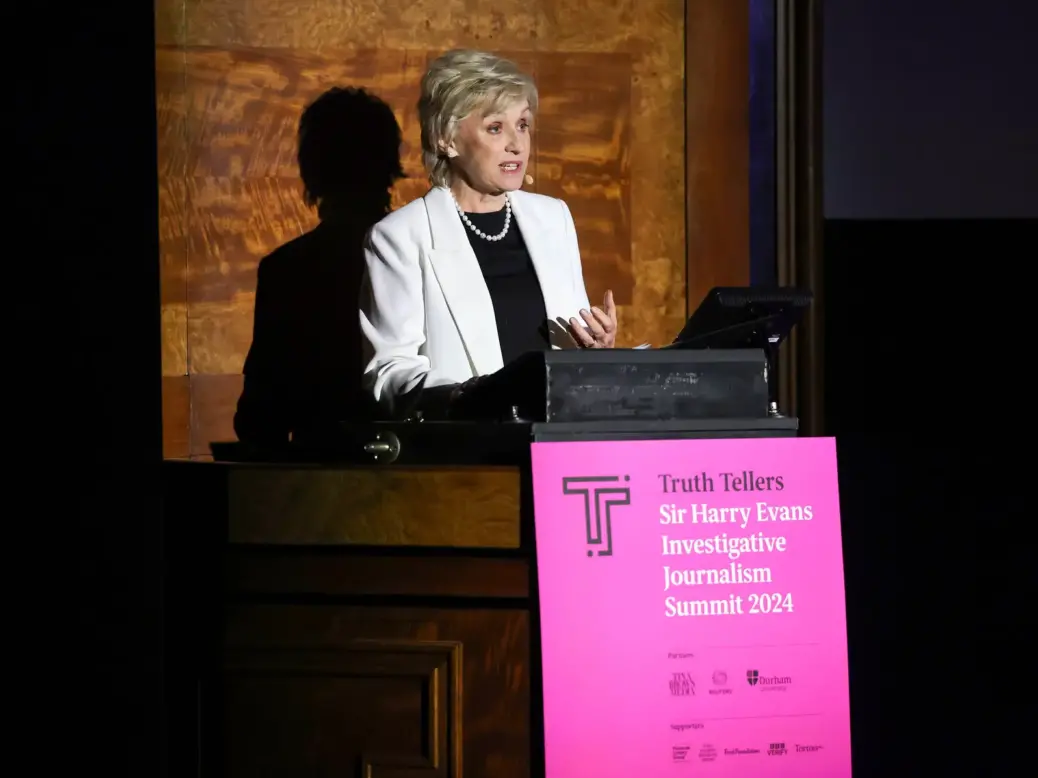
An annual photojournalism fellowship was announced by Tina Brown at the Sir Harry Evans Summit in London.
The award will provide a full salary for the course of the fellowship and offer guidance and mentoring by Reuters and Canada’s Globe and Mail.
Applicants must be in the early stages of their career and propose a deep dive project.
The photojournalism fellowship is the second programme offered in Sir Harry’s memory, with the Global Fellowship in Investigative Journalism having run since 2022. The latter offers a monthly salary of c. £4,444 per month, a £1,250 per month living stipend and a one-off expenses payment of £1,800.
Renowned war photographer Don McCullin has agreed to be a judge in the fellow selection process.
Sir Harry’s widow and former New Yorker and Daily Beast editor, Tina Brown, introduced the Sir Harry Evans Memorial Fund (which encompasses both fellowships).
Brown told Press Gazette: “Organisations don’t send photographers to warzones anymore and frequently you find that photojournalists are going there on their own dime and without any backup.
“So, to have the affiliation with Reuters and Globe and Mail not only gives them the financial capacity to do this work, but also gives them the protection of those organisations.”
The fellowship is funded by David Thomson, chairman of Thomson Reuters, who shared a strong friendship with Sir Harry Evans, both of whom appreciated the power of photojournalism.
Brown said: “David cares very much about keeping photojournalism vibrant and alive, and about supporting, if there is such a thing, the young Don McCullins.”
Speaking at the Sir Harry Summit, McCullin expressed his concerns about the future of photojournalism in a media world which seems obsessed with images of the same celebrities. He asked where are the pictures from Gaza and other conflict zones.
Sir Harry Evans (1928-2020) was voted the Greatest British Newspaper Editor by his media peers. He was instrumental in highlighting the Thalidomide scandal and exposing Britain’s cover up of double agent Kim Philby.
He was one of the first trustees of London’s Photographers’ Gallery. He received the Hood Medal of the Royal Photographic Society and a Lifetime Achievement Award from the International Centre for Photography for his teaching of and dedication to photojournalism.
Out of his 17 books, six of them were about photography and its ethics. His 1978 book Pictures on a Page remains the definitive source about editing and presentation of photographs in the media.
Brown told Press Gazette: “I sometimes see the most amazing pictures used the size of a postage stamp in the New York Times and I think my god, if Harry had been the editor, that picture would have been across the page with a killer heading.”
Asked about her attitude to AI-generated photography, Brown said: “AI may be a good research tool but it’s never going to replace human intelligence or insights.
“An image can lie just as much as prose can.”
The up and running Global Fellowship in Investigative Journalism receives between 400-450 applicants each year from across the world. Brown hopes that it will be a similar case for the photojournalism fellowship.
Durham University, where Sir Harry Evans attended, will exhibit the fellow’s work at the end of the programme.
Email pged@pressgazette.co.uk to point out mistakes, provide story tips or send in a letter for publication on our "Letters Page" blog
